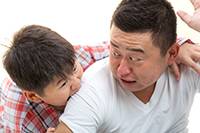Why do some children bite while others don’t? There are a number of possible reasons why children under age 3 bite, almost none of them the fault of a child behavior problem, bad parents, or bad caregivers. Sometimes we think we have a good idea what is causing the biting, but most of the time it is hard to guess what is going on in the child’s head.
Common Reasons Why Kids Start Biting
• Teething. When teeth are coming through, applying pressure to the gums is comforting, and infants will use anything available to bite. Obviously, if this is a likely cause, then teething remedies like a ring or objects to bite will lessen the infant’s need to bite other people.
• Excitement and over-stimulation. When some very young children are very excited, even happily so, they may behave in an out-of-control fashion. For instance, a little 16-month-old girl Natasha loved moving to music. After a session with music and scarves and everyone twirling and enjoying themselves, it was very predictable that Natasha would bite someone if an adult did not help her calm down.
• Impulsiveness and lack of self-control. Infants sometimes bite because there is something there to bite. This biting is not intentional in any way, but just a way of exploring the world.
• Making an impact. Young children like to make things happen, and the reaction when someone is bitten is usually pretty dramatic.
• Frustration. Too many challenges, too many demands, too many wants, too little space, and too many obstacles may lead a child to bite, especially before they have the capability to express frustration through using language. Tips to Minimize Kids Biting at Child Care Teachers in child care are trained to do the following to try to minimize the biting behavior, which parents can also try at home:
• Let the child know in words and manner that biting is unacceptable. Adults’ most stern manner and words should be reserved for acts such as biting.
• Remove the biting child from the situation and focus caring attention on the victim.
• Examine the context in which the biting occurred and look for patterns. Was it crowded? Too few toys? Too little to do? Too much waiting? Is the biting child getting the attention and care he/she deserves at all times?
• Change the environment, routines, or activities if necessary.
• Work with the biting child on resolving conflict or frustration in a more appropriate manner, including using words if the child is capable.
• Observe a child who is a short-term chronic biter to get an idea about when he or she is likely to bite. Some children, for example, may bite not when they are angry or frustrated, but when they are very excited.
• Identify children likely to be bitten and make special efforts to reduce their chance of becoming victims. • Don’t casually attribute willfulness or maliciousness. Infants explore anything that interests them with the mouth, and that includes other bodies.
• If biting continues, continue to observe the group closely. Apply additional resources as necessary to shadow the child.
What can a parent do if their child begins to bite?
Removing significant stresses on the child at home, such as a demanding a schedule or difficult transitions, will make it easier for a child to handle times of stress that do arise. If the child bites other children in your presence, take the same steps suggested above immediately after the biting occurs and look for ways to adapt the environment to prevent biting in the future. If the child is biting at daycare, there is very little you can do other than keep in close communication with the child’s teachers. Fortunately, biting is a stage that passes.
What to do if your child is bitten?
There’s not much worse than seeing a bite mark on your child, and worse, infant and toddler bites are often on the face. All of our parental primal instincts as our child’s protector come into play. It is natural to be upset. But try and keep in mind that it is a consequence of the group situation and not really the fault of the child, the family, or the program. Your child might as easily have been the biter. Bright Horizons centers don’t release the name of the biting child for that reason.
How long do child care centers stick with a biting child?
Good child care centers work very hard to make the program work for every child, and take extraordinary measures to help a child overcome the “biting habit.” Sometimes it feels to parents (and occasionally staff) that too much time passes before a child is disenrolled.Occasionally they might be right. But there is no clear line to indicate when program adaptations have failed to meet the child’s needs and the family needs to find another child care arrangement.
The good news is that all biting children grow out of it, most often in their twos. This happens to the great relief of all: the biting child, the other children and their parents, the staff, and most of all, the biting child’s family.


